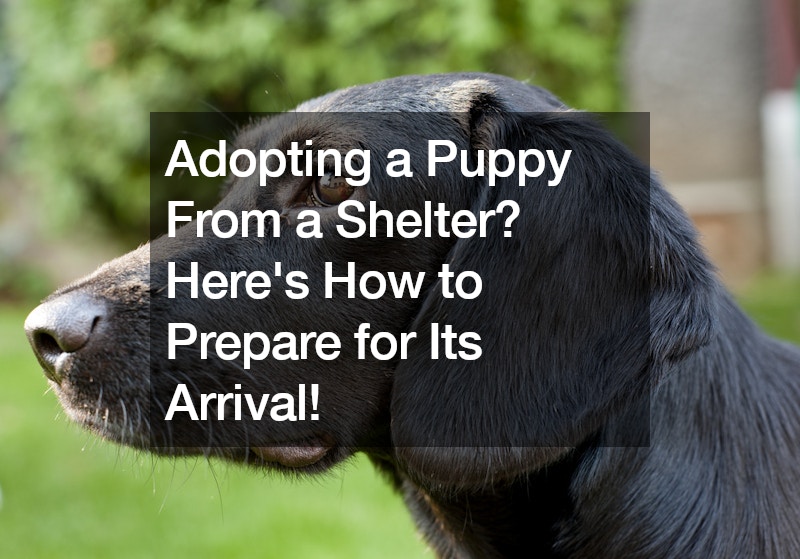Is your family considering adopting a puppy from a shelter? This is a huge step into pet parenthood, and it’s an exciting one! Adopting a puppy is a major responsibility that comes with plenty of love and happiness. Here are 15 steps to help you prepare for your puppy’s arrival, ranging from preparing your home for your new pup to training tips, grooming awareness, safety protocols, and bonding with your dog. Good luck!
1. Finding the Right Shelter Puppy

When considering adopting a puppy, finding the right shelter dog is crucial. Shelter puppies are often in need of a loving home and can bring immense joy to your family. Researching different shelters and visiting them in person can help you find a puppy that is the perfect fit for your household.
It’s important to spend time with the puppy you are interested in to see if your personalities and energy levels align. Remember that each puppy has its own unique traits and behaviors, so choose one that matches your lifestyle.
Adopting a puppy from a shelter not only gives a homeless animal a second chance at life but also helps to reduce pet overpopulation in your community. You might find a large or mini puppy for sale!
2. Preparing Your Home for the New Arrival
Before bringing your new puppy home, it’s essential to puppy-proof your house. This includes securing hazardous items, such as cleaning supplies and electrical cords, out of reach. Consider hiring exterminators to ensure your home is free of pests that could harm your puppy.
Setting up a designated area for your puppy with a comfortable bed, food and water bowls, and toys is also important. Creating a safe space where your puppy can retreat to will help them feel secure in their new environment. An animal control company can provide valuable information for ensuring your home is pest and rodent-free before your dog arrives.
3. Establishing a Routine
As soon as your puppy arrives, establishing a routine is key to their training and well-being. Set specific feeding times to regulate their digestion and bathroom habits. Taking your puppy outside regularly to pee and poop will help avoid accidents in the house.
Consistency is key when training a puppy, so stick to your schedule even on weekends and holidays. Positive reinforcement, such as treats and praise, can help your puppy learn and obey commands more effectively.
Adopting a puppy from a shelter may require extra patience and understanding as they adjust to their new surroundings and routines.
4. Socialization and Training

Training your puppy to behave well outside the home is essential for their safety and the safety of others. Hiring a fence contractor to install a secure perimeter around your property can give your puppy freedom to play while keeping them safe from potential dangers.
A driveway gate keeps your pup safe while they play outside, and wood fencing can also help create boundaries and prevent your puppy from wandering off. Proper socialization with other dogs and people will help your puppy grow into a well-adjusted and friendly adult dog.
Adopting a puppy from a shelter may require extra attention to their socialization needs, as they may have had limited exposure to different environments and situations.
5. Health and Wellness
Ensuring your puppy’s health and wellness is crucial for their overall well-being. Regular visits to a pet emergency vet can help monitor your puppy’s health and address any concerns promptly. Vaccinations, deworming, and flea and tick prevention are essential to keep your puppy healthy.
Mini puppies for sale may need additional care and attention due to their size and potential health risks. Monitoring your puppy’s behavior and appetite can help you detect any signs of illness early and seek veterinary care when needed.
Adopting a puppy from a shelter means providing them with the necessary medical care and vaccinations they may have missed out on before coming into your care.
6. Nutrition and Feeding
Proper nutrition is vital for your puppy’s growth and development. Consulting with dog groomers for advice on the best food for your puppy’s age and breed can help ensure they are getting the nutrients they need. Mini puppies for sale may require specialized diets to support their unique health needs.
Feeding your puppy at regular intervals and monitoring their weight and body condition is important to prevent obesity and other health issues. Providing fresh water at all times and avoiding giving them human food can help maintain their overall health.
Adopting a puppy from a shelter may require transitioning them to a new diet gradually to prevent digestive upset and ensure they are receiving the proper nutrition.
7. Exercise and Playtime

Exercise is essential for your puppy’s physical health and mental stimulation. Setting aside time for play and exercise can help keep your puppy fit and prevent behavior issues due to boredom. Keeping your puppy safe from dangerous plants by looking into plant residue studies can help prevent accidental poisoning.
Engaging in activities such as fetch, tug-of-war, and short walks can help burn off your puppy’s excess energy and strengthen your bond. Providing them with appropriate toys and interactive games can keep them entertained and engaged while you are away.
8. Grooming and Hygiene
Maintaining your puppy’s grooming and hygiene is essential for their health and well-being. Regular grooming sessions, either at home or with professional dog groomers, can help keep your puppy’s coat clean and free of mats. Brushing your puppy’s teeth and cleaning their ears and eyes regularly can prevent dental and ear infections.
Trimming your puppy’s nails regularly and checking their paws for injuries or foreign objects can prevent discomfort and paw pad issues. Bathing your puppy with a gentle dog shampoo and drying them thoroughly can help keep their skin healthy and prevent skin irritations.
Adopting a puppy from a shelter may require introducing grooming routines gradually and using positive reinforcement to help them feel comfortable during grooming sessions.
9. Behavior and Communication
Communicating effectively with your puppy through positive reinforcement and clear commands can help build a strong bond and prevent behavior issues. Recognizing your puppy’s body language and vocalizations can help you understand their needs and emotions better.
Consistency in your training methods and expectations can help your puppy learn quickly and feel secure in their routine. Rewarding good behavior with treats and praise can reinforce positive behaviors and encourage them to repeat them in the future.
Adopting a puppy from a shelter may require extra patience and understanding as they adjust to their new home and family dynamics, so be patient and consistent in your training efforts.
10. Traveling and Outings

When traveling or going on outings with your puppy, it’s essential to plan ahead and ensure their safety and comfort. Dog kennels can provide a safe and secure environment for your puppy while you are away. Training your puppy to ride in a car safely can prevent accidents and anxiety during travel.
Packing essential items such as food, water, poop bags, toys, and a bed can help your puppy feel at ease in new environments. Taking short trips and gradually increasing the duration can help your puppy acclimate to traveling and outings.
Adopting a puppy from a shelter may require extra care and attention when traveling, as they may be unfamiliar with car rides and new surroundings. Patience and positive reinforcement can help your puppy feel calm and secure during outings.
11. Dealing with Separation Anxiety
Separation anxiety is common in puppies, especially those who have been adopted from shelters. Gradually acclimating your puppy to being alone and building up their independence can help prevent separation anxiety. Providing them with a safe space, such as a crate or a designated area, can help them feel secure when you are away.
Leaving comforting items, such as a piece of your clothing or a favorite toy, can help ease your puppy’s anxiety and provide them with a sense of familiarity. Using positive reinforcement and desensitization techniques can help your puppy learn to be alone and feel calm when you are not around.
12. Emergency Preparedness
Preparing for emergencies is essential when caring for a puppy. Knowing the location of the nearest pet emergency vet and having their contact information readily available can help you act quickly in case of an emergency. Creating a first aid kit with essential supplies for your puppy, such as bandages, antiseptic wipes, and a dog thermometer, can help you provide immediate care when needed.
Having a plan in place for natural disasters or unexpected events, such as a fire or flood, can help ensure your puppy’s safety and well-being. Keeping important documents, such as vaccination records and microchip information, in a secure and easily accessible location is also crucial for emergency preparedness.
Adopting a puppy from a shelter may require extra caution and preparation for emergencies, as they may have unique health or behavioral issues that need to be addressed promptly in case of an emergency.
13. Celebrating Milestones and Achievements

Each milestone and achievement your puppy reaches is worth celebrating. Whether it’s mastering a new command, reaching a training goal, or overcoming a fear, acknowledging their progress with praise and treats can reinforce their positive behavior and boost their confidence. Taking photos and creating a puppy journal to document their growth and development can also provide lasting memories of your journey together.
Mini puppies for sale may require additional attention and care to achieve milestones and reach training goals due to their size and unique health needs. Recognizing and celebrating even small accomplishments can encourage your puppy to continue learning and growing.
Adopting a puppy from a shelter may require extra encouragement and support to help them build confidence and trust in their abilities, so be patient and consistent in your training efforts and praise their achievements along the way.
14. Building a Lifelong Bond
Building a lifelong bond with your puppy is a rewarding and fulfilling experience. Spending quality time together, playing games, going on walks, and snuggling on the couch can strengthen your bond and create lasting memories. Providing your puppy with love, care, and attention can help them feel secure and cherished as part of your family.
Regular training sessions, positive reinforcement, and consistent routines can help your puppy trust you and feel comfortable in their environment. Communicating effectively through body language, vocal cues, and clear commands can strengthen your bond and deepen your connection with your puppy.
Adopting a puppy from a shelter may require extra patience, understanding, and love to build a lifelong bond with your new furry friend, so enjoy the journey and cherish the moments you share together.
15. Preparing Your Kids
Preparing children for a new puppy involves a blend of excitement and responsibility, ensuring they understand the joys and challenges of pet ownership. With careful planning and communication, children can develop a strong bond with their new furry friend while learning valuable life skills. Firstly, it’s essential to involve children in the decision-making process. Discussing the responsibilities and commitment required for pet care helps set realistic expectations. Emphasize that a puppy is not just a toy but a living creature needing love, attention, and care.
Education plays a pivotal role. Teaching children about a puppy’s needs, such as food, water, exercise, and veterinary care, fosters empathy and understanding. Books, videos, and online resources tailored for children can make learning fun and interactive. Setting rules and boundaries is crucial. Establish guidelines on gentle handling, appropriate play, and safety around the puppy. Teaching children to respect the puppy’s space and signals helps prevent accidents and fosters a harmonious relationship.
Incorporating the children into the puppy’s routine encourages responsibility. Assigning age-appropriate tasks, such as feeding, grooming, and cleaning up after the puppy, instills a sense of ownership and accomplishment. Supervised interactions allow children to bond with the puppy while learning to anticipate its needs. Preparing the home environment is essential for the puppy’s safety and comfort. Childproofing areas where the puppy will roam reduces the risk of accidents and keeps both the puppy and children safe. Designating a cozy space for the puppy’s bed and toys provides a sense of security and establishes boundaries.
Encourage open communication. Address any concerns or questions the children may have about the puppy’s arrival. Assure them that it’s normal to feel excited and nervous, emphasizing teamwork in caring for the new family member. Lastly, lead by example. Demonstrating patience, kindness, and consistency in caring for the puppy sets a positive example for children to follow. Celebrate milestones and achievements together, reinforcing the bond between children and their furry companion. By involving children in the preparation process and providing guidance and support, families can ensure a smooth transition and create lasting memories with their new puppy.
Adopting a puppy is a great way to provide a home to an animal that needs one. When your family is ready to provide a stable environment with lots of love to a new dog, consider following this guide to prepare your home and family for this transition. Happy pet parenthood!







